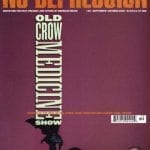The Black Keys – Modern Primitives
How they met might forever remain open for debate, but the two bandmates have no trouble agreeing they knew they were meant to play music together.
“We both loved Wu-Tang, and we both loved that dirty style of recording that you hear on that first Wu-Tang record, 36 Chambers,” Auerbach recalls. “We were both raised on soul music — you know, Stax and Motown. We just had this connection, this unspoken thing.”
When the Black Keys signed to Fat Possum for the release of their second album, Thickfreakness, it wasn’t a decision they made lightly. To an outsider, it should have been a no-brainer. Arguably among the most respected blues labels in America, Fat Possum has released records by everyone from relative obscurities such as T-Model Ford (a Black Keys favorite) to bona fide legend Junior Kimbrough. (In what was part tribute, part acknowledgment that Kimbrough’s music is practically sacred to Auerbach, the Keys recorded six of his songs earlier this year for an EP titled Chulahoma.) Fat Possum is as associated with the blues as Epitaph Records is with punk rock.
And that, evidently, was the problem.
“We were nervous to sign with Fat Possum,” Carney admits. “They are considered a blues label, so we knew it would be harder to resist being labeled as a blues band. But the guys at Fat Possum are such sweet dudes that we figured they would help us figure out a way to work around that.”
Getting to the bottom of why the Black Keys are loath to be pigeonholed as a blues act doesn’t require a lot of work. Start with the fact that Carney, as mentioned earlier, has no use for the genre in general. You don’t need to have seen the Blues Hammer bar scene in Ghost World to figure out why that is. Somewhere along the line, the blues was dragged away from its roots. What started out as the purest and simplest of all American music forms is today more about how long you can wank a solo out on your Fender Telecaster. The sad reality is that most current blues acts have about as much to do with Robert Johnson as sanitized pop-punkers Good Charlotte have in common with the Sex Pistols. The Black Keys don’t want to be part of that club.
“The modern meaning of the genre,” Carney says with a laugh, “can be summed up like this: middle-aged men in oversize Corona T-shirts and oversize Corona button-downs.”
In case that’s not clear, Auerbach clarifies: “I like blues music, and I’ve been influenced by it, but Pat does not like blues. It’s not something that we listen to in the car. And we don’t play blues clubs. I think that if we ever tried to play a blues club, people would leave. We play about a hundred times louder than every other band, the guitars feedback, and there are all sorts of fuzz pedals and shit. And we don’t play cheesed-out blues-guitar solos.”
All this begs the question of what the Black Keys do play.
“I don’t really don’t know how to describe ourselves,” Auerbach admits. “People can think what they want, but if they come to our show and expect to hear a blues band, we’re not going to be what they expect. We play something way different. I don’t know how to describe it — maybe a mishmash of American music.”
Some will suggest the Black Keys protest too much. After all, there are moments on Magic Potion (check out the slow-burn wonder “The Flame”) where the band sounds every bit as authentic as the throwback bluesmen Auerbach adores. Yet it’s easy to see why the Keys sometime get frustrated. Led Zeppelin didn’t get pigeonholed as a blues band, even though Robert Plant and Jimmy Page made no attempt to hide the fact that they viewed the Mississippi Delta as Mecca.
On that same tip, you won’t find the White Stripes in the blues section of your favorite indie record store. Hell, the Jon Spencer Blues Explosion has the word blues right in its name, and yet it’s generally filed under alternative. If the Black Keys have something in common with such acts, it’s that you don’t necessarily have to like antiquated American music to love them.
The best way of explaining where the Black Keys belong isn’t to talk genres, though, but instead to think about how the band approaches the business of making music. Start with Auerbach’s inherent hatred of purists — those who would argue that distortion-stunned guitars, old-school hip-hop beats, and Fat Possum vocals can’t exist within the same song. Then think long and hard about what Carney and Auerbach learned from Alfred McMoore, the schizophrenic folk artist who inspired the name the Black Keys.
“I’m a minimalist,” Auerbach says. “I love minimalism in art, and I love outsider art. Being around so much folk-art as a kid, I’m drawn to that whole self-taught mentality. That’s what I love in music — notes that are slightly out of tune. Basically things that aren’t quite right.”
Mike Usinger is a writer and editor based in Vancouver, British Columbia. He laughed until he cried during the Blues Hammer scene in Ghost World.




